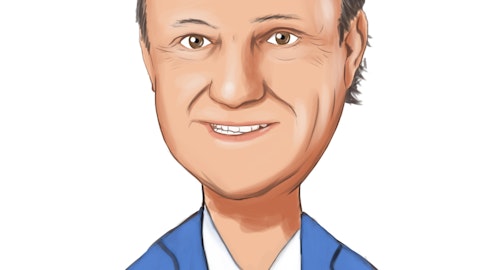David Becker : I would say, some of our peers over the last 18 months to 24 months for any myriad of reasons coming out of COVID, balance sheet issues, deposit issues, and some of the smaller community banks where all of a sudden, their customers have woke up to the fact they can get much better money elsewhere and pulling deposits. There’s just a lot of people that have pulled back in the SBA arena over the last 12 months to 18 months and we’ve been able to hire some absolutely tremendous people with very seasoned veterans in the industry with good lead sources, good operational background, good oversight. So, I think our key to success versus the rest of the market quite honestly has been the people we’ve been able to attract over the last 24 months to 36 months, as a lot of folks have put the brakes on and either stop lending in total or pulled back for a period of time.
As you well know, any good sales person can’t stand idle for very long. So, we’ve been very, very fortunate to kind of hit the market at the right time and really build a tremendous team of people all across the country in the SBA arena. I think that’s our key to success compared to some of the other folks in the market today. And again, our underwriting standards, we don’t view SBA licenses ability to loan to anybody. We still have some standards of protocol that we go through. We do not approve every loan that we see. And I think in some respects, we’re a little faster and maybe a little more efficient than some of the other facilities because of some of the tech we’re able to use. Some of the systems and SBA are very antiquated. Some of them are real close to old green screen still but we’ve got great people behind it that can move things along.
And I think our key to success really is people.
Operator: Next question will be from Nathan Race at Piper Sandler. Please go ahead.
Nathan Race : Good afternoon. Thanks for taking my question. Just going back to your comment’s kind of around some of the CDs that have maturing over the next couple quarters. I’m not sure if you called it out, but just in terms of the replacement cost today.
Ken Lovik: Well, I mean if you, I guess, if you make the assumption that, that our kind of our blended rate on new originations and renewals currently, which is kind of a 495 number by the time we get to the third quarter, we’re pretty much right on top of that. And in fact, over the next 12 months, there’s $1.2 billion of CDs maturing at roughly that same rate. We’ve kind of again, in another quarter or we’re going to hit that repricing where the repricing gap is essentially zero.
David Becker : Provided the fed doesn’t —
Nathan Race : Assuming the fed remains on pause through the end of this year just based on what you guys are seeing from a competitive perspective relative to other internet banks, do you foresee the opportunity in your margin guidance to reduce certain rates ahead of fed cuts or how are you guys kind of thinking about that opportunity potentially?
David Becker : We dropped CD rates Nate from six months up about a month ago. We just talked earlier this week on a few of them. We’re going to drop another five basis points. I think everybody’s — from the financial institution level. If you’ve been watching money market rates American Express ally, a bunch of folks have bumped down. I think Cap One has lowered their money market rates by 5 basis points, 10 basis points here in the last 30, 45 days. So, I think the industry is ready to drop rates and as they do, we will as well. And as Ken said, we’re right on top of it on the CD level, and I think, we’ll actually get that turned around the other way. So, the replacements coming on board today will be cheaper than what’s rolling off in the not too distant future.
I agree a 100% with Ken, if the fed does bump anything, it’ll be a 100% data, obviously on the fed funds floaters, but on the CD world, that’ll be almost a hundred percent across the line too. Our basic money market account rate for the folks less than a million in deposits, that’ll probably stay pretty constant and won’t be a 100% beta, maybe a 5-10 point bump down when the Fed moves. But anything will help us, and I think we’re in a great position going forward that we could actually be in a position in the third and fourth quarter for the replacement funds to be cheaper than what’s rolling off.
Nathan Race: Okay. Great. Very helpful. And then just on deposit growth expectations, I think, Kenya guided to 5% to 10% loan growth this year. Is the expectations that deposit growth will largely run at a consistent level or is there maybe just an opportunity to bleed down some of the excess cash that you still have on the balance sheet?
Ken Lovik: Yes, probably a little bit of both, right? I mean, we’ve built some liquidity here in the first quarter. I think we recognize there’s probably smarter to keep higher liquidity than historical, but there’s, I think we expect to probably bleed down a little bit of that. But I expect deposit growth to obviously it was much more than loan growth in the first quarter, but it should keep pace with loan growth maybe a little bit more as we bleed some cash down. But it should, I mean it should be relatively in line with loan growth throughout the rest of the year.
David Becker : We also have some commitments we made back in the financial craziness following Silicon Valley and everything blowing up. We made some pretty long-term commitments, well long-term at the time of 12 month to 14 month, 18 month commitments with individuals that had a Fed funds plus 10, plus 20 plus 25. And we’ve got a bunch of that coming due here almost $250 million to $300 million over the next three to six months. And we’re in a position now that we can let that go away and replace it with less than fed funds money. As Ken said, we’re keeping a little extra liquidity on the balance sheet today for opportunities like that to reprice stuff and let some of that more broker type money go away here over the next three to six months.
Nathan Race: And David, I think earlier you mentioned, revenue from partnerships is expected to double year-over-year versus 2023. I guess that number is not necessarily disclosed and release. So, can you kind of help frame out specifics around that?
Ken Lovik: Yes. As I said in my comments, we had about 600,000 plus of FinTech partnership revenue in the first quarter. And when we look at our forecast, that number’s going to grow. It was up almost 50% over fourth quarter. In David’s comments, what he was trying to say is that, don’t expect that to grow 50% every quarter here. But there is a big piece of that that’s recurring revenue. So, we’re going to see some more kind of, more single to low double-digit growth in that number. But for the full year, our expectation is that FinTech partnership revenue, which includes interest income and fee income, will be about three times what our revenue was last year.



